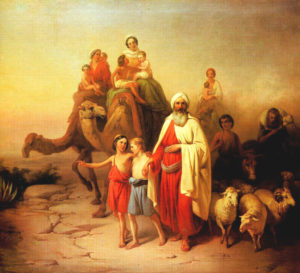Thoughts on Today’s Lessons for March 12, 2017

Abraham’s Journey from Ur to Canaan (1850). Oil painting by József Molnár (1821-1899), Hungarian National Gallery.
We began Lent with thoughts of temptation and repentance. Now we turn to faith, the deep trust that God will be with us as we make decisions that shape our lives. In our first reading, we hear God’s promise to Abram – later to be called Abraham – who even in old age chose to take the risk of following God’s direction to uproot his family and begin the people’s long journey toward the promised land. For Abram’s faith, God will bless him and his family; and through him, God will bless all the families of the Earth.
When I served as a hospital chaplain, I kept one of my bookmarks firmly set on this Psalm. Perhaps as much as the beloved 23rd Psalm, it brought comfort and peace to many people as they and their loved ones faced whatever crisis had brought them in search of urgent care. We lift up our eyes to the hills, seeking help, and that help comes from God who watches over us and protects us. Note well, as Paul will muse in the second reading, that God does not protect us in repayment for our faith or for anything we do. God watches over our going out and our coming in because that is who God is, and that is what God does.
Second Reading: Romans 4:1-5, 13-17
Paul recalls the foundational story of Abraham in his pastoral letter to the church in Rome, musing on theology that seems consistent with Psalm 121: God’s promise of eternal life comes to us, as it came to Abraham, not in reward for anything that we have done to deserve it, but entirely through our faith by grace. Seeking in this letter to restore Rome’s Jewish Christians and pagan converts to unity, he reminds them that God’s promise depends on faith, not something due to us but a gift. It was given to all the nations, not to Abraham’s descendants alone.
Gospel: John 3:1-17
Nicodemus, a Pharisee, comes by night to talk with Jesus, but remains bewildered by his mysterious words. What does it mean to be “born from above,” or, in some translations, “born again”? Nicodemus just can’t grasp the distinction between being literally born of flesh as an infant and being born of water and the Spirit in faith. Then we hear the familiar words of John 3:14, “For God so loved the world that he gave his only Son, so that everyone who believes in him may not perish but may have eternal life.” Does this mean that only Christians can be saved? Jesus’ teaching surely rules that out. Even the next line makes clear that Jesus did not come to condemn the world but to save it: all the world, all the nations that God blessed through Abraham.
